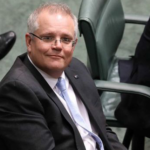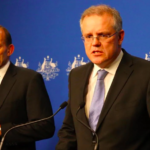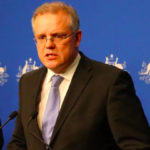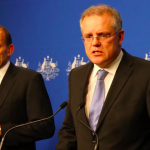Faced With Multiple Domestic Crises, Morrison Picks a War With China
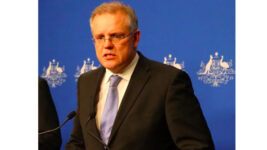
As the prime minister launched the 2020 Defence Strategic Update on 1 July, he assured those gathered at the Australian Defence Force Academy that the plan “will guide our nation through one of the most challenging times we have known since the 1930s and the early 1940s”.
And at that point in his speech, Scott Morrison went on to wax lyrical about the support ADF troops have provided during the recent multiple crises the nation has faced with last summer’s unprecedented bushfires and the continuing COVID-19 pandemic.
Then the PM returned to likening the strategic threat posed by China in the Indo-Pacific region today to that once posed by Nazi Germany in Europe. And he took his analogy a step further to the point where “our region” is now facing its greatest “existential threat” since the Second World War.
Indeed, according to the “man of faith”, the Indo-Pacific “is the focus of the dominant global contest of our age”, with China’s build up in the South China Sea, the current dispute Beijing is having with New Delhi along the Ladakhi-Tibetan border, as well as China’s sovereignty claims over Taiwan.
So, following the climate-provoked summer of bushfires and the climate-exacerbated pandemic, the tone-deaf Coalition is not only promoting full-scale investment in more fossil fuel options, but now its budgeting $270 billion over the next decade in a rising cold war against China.
Love the smell of napalm
“Regional military modernisation is occurring at an unprecedented rate”, the PM told the ADF Academy, and he added that “disinformation and foreign interference have been enabled and accelerated by new and emerging technologies”.
“Of course, terrorism hasn’t gone away” our enlightened leader continued, “and the evil ideologies that underpin it… remain a tenacious threat.”
But, as the US and China posture against one another, Morrison advises that security in the region is not only up to those nations, and Australia needs to take a more proactive role.
So, that’s why he’s updated what was previously set out in the 2016 Defence White Paper.
The new strategic update outlines that $270 billion over ten years will fund military expansion with a focus on “more potent capabilities to hold adversary forces and infrastructure at risk further from Australia, including longer-range strike weapons, cyber capabilities and area denial”.
So, as the outpouring of public sentiment calling for action on climate has been silenced by COVID restrictions, the government has come forward with a plan for a more “credible military force”, along with enhancement of “the lethality of the ADF for high-intensity operations”.
“Ladies and gentlemen,” the PM concluded, “the strategic challenges of today and tomorrow call Australia, in many ways as we’ve been called before, at difficult times.”
An awareness raising activity
Morrison’s statement regarding the nation’s forthcoming heavy investment in long range weapon capabilities came just a fortnight after he announced that Australian organisations were “being targeted by a sophisticated” cyber attack.
This online assault was being perpetrated “across a range of sectors”. And the government was aware that it was “a sophisticated state-based cyber actor because of the scale and nature of the targeting”.
But as questioning proceeded, the PM admitted there wasn’t any imminent onslaught that day, but rather there was more of an ongoing cyber annoyance.
“Regrettably, this activity is not new. But the frequency has been increasing,” the PM said, adding that he had been working with agencies to “thwart this activity”. Then he went on to say that “the purpose of raising this matter” was simply to “raise awareness of these specific risks”.
In response to further questioning, the prime minister refused to name China as the nation behind the attack, preferring to repeat that it was a “state-based actor”, but he maintained that he could not stop anyone else from coming to the conclusion that Beijing was behind it.
And this sudden press conference about a “malicious” widespread cyber attack, with the mere raising of China as the potential “state-based actor”, was enough to put the idea out that Beijing was the culprit.
The coming war with China
Relations with China have been strained since our PM called for a COVID inquiry. This led Beijing to warn its citizens not to travel to Australia due to a spike in racist incidents. While DFAT has put out travel advice warning that Australians could face “arbitrary detention” if they travel to China.
Morrison’s recent China posturing has been attributed to his position as US deputy sheriff in the Indo-Pacific region, as relations between Washington and Beijing have been deteriorating over recent months.
The Trump administration has been calling out the Chinese Communist Party (CCP) over human rights abuses in Hong Kong and Xinjiang, it’s challenged Beijing’s claims over the South China Sea and it’s been pushing for a broader boycott of Chinese tech giant Huawei.
However, according to veteran Australian journalist John Pilger, the US aggression towards a rising China is nothing new. His 2017 documentary The Coming War With China posits that the US has been slowly encircling the East Asian nation since 2011, with a build-up of military bases.
Indeed, Pilger warned at the time of his documentary’s release that “Australia is sleeping walking into a confrontation with China”. Although, these days, with Morrison at the helm, the citizenry could be mistaken for thinking we’re fast becoming a bull charging at Beijing’s gate.
Concealed motivations
Australians have looked on with distress as the CCP has recently imposed draconian laws in Hong Kong. These new measures seem to be fast turning a city known for its democratic values into a jurisdiction where personal freedoms will no longer be guaranteed.
In response to this, the Australian government has announced it will be extending visas to certain Hong Kong citizens with a view to providing them with permanent residency, while Canberra has also indicated that it will be ending extradition arrangements with the East Asian city.
And while this show of solidarity with Hong Kong citizens is welcomed, when you take it in context with other recent developments, it can certainly looks like there are more troubling motivations behind it.
This is especially the case if you take into account the not so welcome approach prime minister Scott Morrison has long taken to desperate people fleeing authoritarian regimes from elsewhere in the world.


